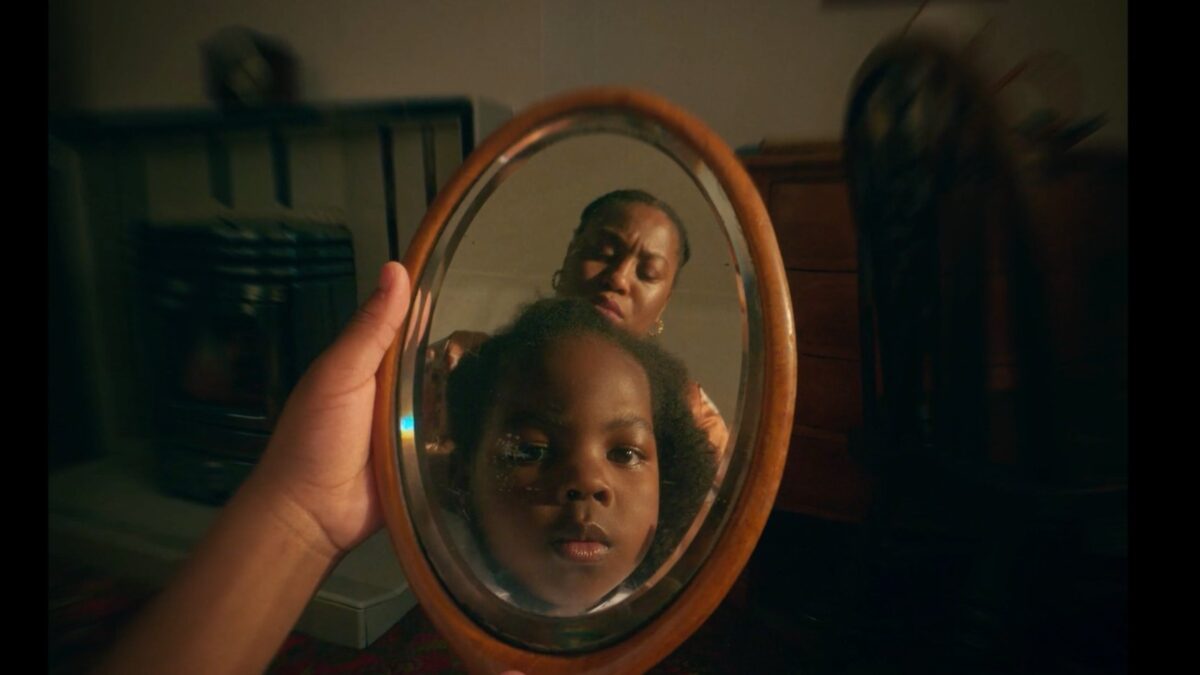
Like all good stories, the story of creating Monochromatic is one grounded in personal reality supported by historical facts.
This post was written by Karen Bryson.
I felt compelled to write Monochromatic as a response to the murder of George Floyd and the subsequent BLM movement in 2020. I wanted to write a piece about the inevitable moment when a Black child realizes the world operates with bias when it comes to the color of
their skin.
I began speaking with my Black friends and my family about their experiences as children. Many, like me, remembered a defining moment while for others it wasn’t as clear cut.
That led me to the nature of memories. Here’s a question: Do you ever see yourself in a memory?
Another question: Do you remember whole conversations from those memories?
My answer would be no on both counts! That leads to why I chose to film it entirely from Grace’s (Kenedy McCallam-Martin) POV during the final scene. It wasn’t a cheap gimmick, but rather something I gave considerable thought to. I couldn’t shake it.
We tend to remember the moments in our lives that have an impact. That fed into the non-linear nature of Monochromatic, fragments of pinnacle moments. What we see as an audience is what the innocent Grace chooses to focus on, juxtaposed with the brutality of an often-hostile UK in 1977, the period Monochromatic is mainly set in. It is an environment her parents desperately try to protect her from.
A period piece, on a short film budget, is always going to throw up major challenges. We needed as many mechanisms to push the narrative so I decided to shoot in a 4:3 aspect ratio (standard ‘70s TV format).
I also wanted to tackle and explore little Grace experiencing racism for the first time in a visceral way by creating an immersive experience for an audience. For it all to land and have an impact, we needed to see Grace early on in the film and glimpses throughout. That’s where the idea of reflections came in–a technique widely used in 1970s film. This, and shooting in 4:3, helped tremendously in recreating London 1977’s Wood Green.
Storyboarding was essential for a project of this nature. With the time constraints that come with a short film making having this structure meant we didn’t veer too far off-piste.
I had very specific visuals that were critical to getting a sense of Grace’s character without really seeing her, aside from the reflections. From there our brilliant DoP, Tristan Chenais, and I discussed, along with our VFX team, the various ways we could achieve the desired outcome.
Even with rigorous prep, I found most of directing is problem-solving, sometimes on the spot. There were several moments we had to go from plan A to plan B and even C. Being in the moment and discovering something spontaneous felt like magic. In hindsight, I found it quite exciting.
The producers and I were aware of the importance of putting together a diverse “killer team.” We struck lucky across the board both in front and behind the camera. They all had a connection with the work and every person involved gave a piece of their creative heart and talent, which I believe is palpable in Monochromatic.
From working with the incredibly talented editor Rebecca Lloyd to our fantastic post-production team, our composer, our songwriter, and our sound designer, seeing all the pieces of the creative puzzle falling into place is thrilling.
Monochromatic was certainly an unconventional and ambitious short film to make for a first-time writer/director like me.
However, with decades of experience as an actor and an incredible team including an exceptional cast, the wonderful producers from Mono Films, Shakyra Dowling, and Lorraine Bhattachary, who completely believed in me and my vision. With the invaluable support of Flying Colours Productions, David Harewood, and Rajita Shah, I think we made a special film, which makes me proud.














